A Conversation With Cisco's John Chambers
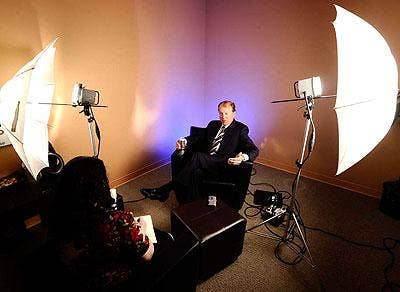
Cisco Systems Chairman and CEO John Chambers recently sat down with ChannelWeb for a wide-ranging discussion that touched on everything from the future of networking to the economy to the presidential election. Here are edited excerpts of the conversation.
Cisco has been moving well beyond just selling routers and switches. Is it still appropriate to call Cisco a networking company?
Chambers: Well I think the network will become the enabler of all forms of IT and communications. So our core competency is the network capability. But the network's moving from being dumb plumbing, if you will, to enabling business solutions which change not only the way we work, but the way we live, play and learn. And so the relevance of the network is evolving and with that Cisco and our partners will have to evolve as well. The nice thing is that this is an issue that means a large amount of growth and profit opportunities for us all.
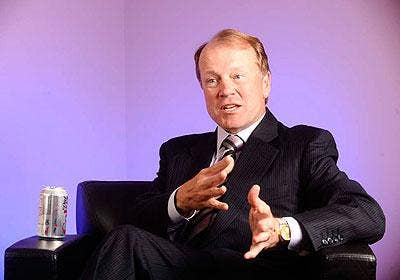
Given all the pies you have your fingers in, which one technology do you think is really the indicator of where this company is going?
Chambers: Maybe this is the right way to answer it -- the key area that probably we are architecting more than anybody else is the movement toward collaboration enabled by network tools called Web 2.0 ... Instead of doing one or two [major projects] a year, I can do 20, and 20 may end up being too conservative. It will be the productivity generator for the next decade.
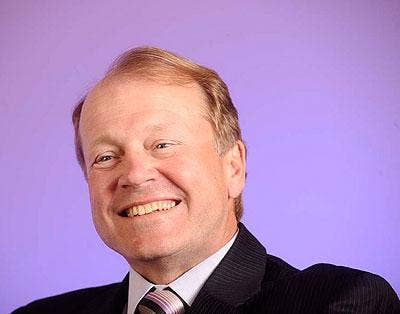
What are the ways that you think your channel partners need to move to really latch onto this opportunity and make the most of it?
Chambers: Well, the exciting thing is we're all proud to be plumbers. And plumbing is a very honorable profession and it has been very lucrative for us all. And we can continue to be plumbers, or we can take plumbing and move it to intelligent networks and begin to provide solutions. So each of us in our partnering mode has to decide what is our opportunity and appetite for evolution and realize that [if] we just really install products and make them work that we'll not have near the margins as if we're able to bring solutions to customers and capabilities in business model change.
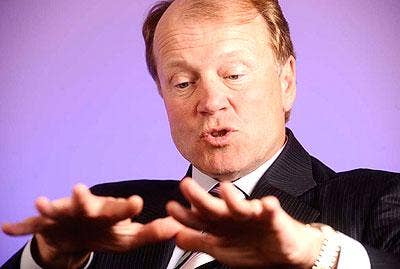
What then is the biggest challenge you're facing with Cisco and then separately, what's the biggest challenge facing your partners?
Chambers: I think our challenge is the same. How do we evolve from selling boxes to systems and solutions. And remember from the first day I came here to Cisco I moved us from a direct approach to the market to a channel approach to the market, which is what we will continue to be. So it's how do we together evolve to where this market is going not to where it has been in the past.
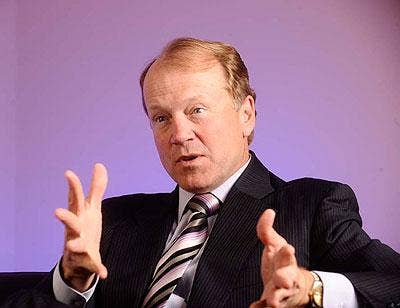
To be fair, that's the message that you have been putting out to your partners for several years now. Are there specifics that it make it more difficult now than it has been in the past?
Chambers: It's actually accelerated now, because a lot of the basic concepts on collaboration are now taking off. A lot of the acceptance of Web 2.0 technologies which many people would have said, "No, that's just for the young people or that's what our kids do" what they are now realizing that in business ... with replicatable process built into these capabilities, it probably will be the next frontier for productivity. Put a different way, the network will probably enable the next major wave of IT spending as well as communication spending. So the role of the network has changed: it's changed from being infrastructure, primarily a box mentality, to an architecture approach that provides business solutions. And as such, we at Cisco have to change and so do our channel partners.
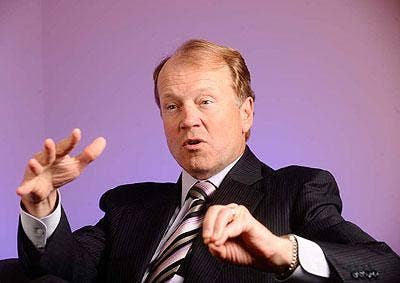
With so much more emphasis now on applications, do you feel like you have the right set of channel partners to make that push?
Chambers: There will be certain channel partners who primarily stay within a product area or a solution type area, there will be others who architecturally play across the whole gamut ... As we move into software-as-a-service and other related areas -- bandwidth-as-a-service, storage-as-a-service, processing power-as-a-service -- how do we sell differently and how do we evolve as an organization? So if we do our job with our channel partners, we outline here's where we think the industry is going, here are the multiple areas we can work on together, and then each of our partners have to say here's where my expertise is and here's where I think I can have sustainable differentiation and then here's where I need to go.

Given your planning cycle of three to five years, what's your vision for what Cisco will look like in five years?
Chambers: The future will be about any device to any content and it will be about intelligent networks. The second thing is that everything will come as a service. It will start off with software-as-a-service, but there will be services as a service, you will be able to buy technical support from our customers on either a contract basis or on an as needed basis ... If you think of Cisco three to five years from now, we have the opportunity along with our partners to be the most influential company in the world, not just on communications, but also in IT. And the role of the network will evolve dramatically, moving from merely transport or plumbing to more of an intelligent infrastructure that makes it completely transparent to where your applications are, where your storage is, where the processors are, what type of device you're on, [whether you are] at home or at your work or in your car or at a hotel -- your services automatically find you and move to you.

You've talked a bit on some of your earnings calls about how the economy particularly the US, is starting to become a little bit soft -- can you tell us what you are seeing there?
Chambers: Well, nothing I say today should be interpreted about any, in any way about my current quarter, but what we are hearing from our customers is exactly what we are all reading in the press, which is there's a lot of uncertainty as the market goes forward. In the last conference call we signaled that we thought we were headed for some relatively short term bumps, that in our view this would be relatively short term and not too deep ... Unfortunately based on the data that's come out in the last month-and-a-half or two, I think more and more people would say that's probably the scenario that's going to occur. Having said that, we do not see it being dramatic and we don't see it lasting a long period of time or being unusually deep.
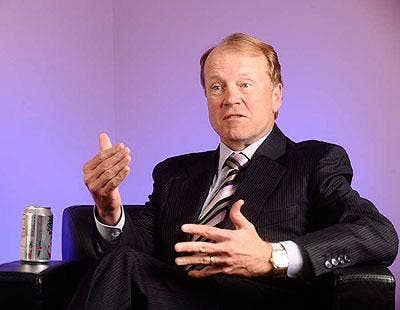
Yet you remain optimistic?
Chambers: These are normal bumps that occur in marketplaces. You do see the companies heading into these bumps in the best financial shape they've been in. Normally when you go into a slow down, the companies are spread too thin, don't have a lot of cash, and unemployment is already edging up. Our unemployment situation in the U.S. is relatively good. Companies have great balance sheet positions. I do think you are about to enter a new era of productivity within that scenario and you've got an unusually solid global economy. Where before the U.S. was the engine for the world, now we are one of multiple engines. It remains to be seen how interdependent we are or are not. There are different points of views on that.
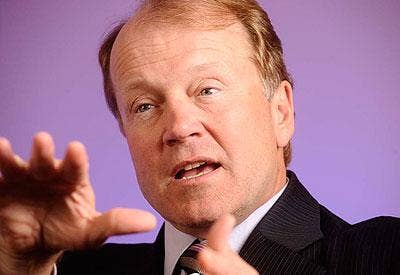
Do you see hesitancy coming down into the SMB as well or is it primarily just at the top?
Chambers: No, I think it varies by industry and it varies a little bit by geography. Enterprise tends to move more as groups, where SMBs, if their business is good, they spend. If their business slows, they don't spend as much. Then the key is also, are you talking about areas you traditionally have been successful in the SMBs with or are you talking about moving in new areas, such as wireless, such as video, such as security, such as business solutions, such as collaboration, Web 2.0 technology, etc.? So it's really a question of how much of the customers' spend do you get and is the role of the network evolving as we think it is -- dramatically expanding beyond what you would have described it as doing just a couple of years ago.
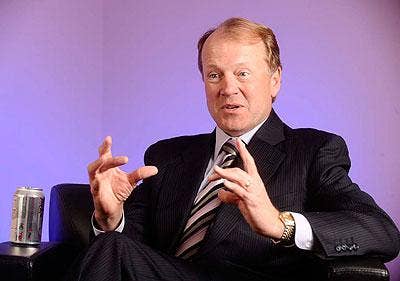
What's your advice to your channel partners on how to push through this?
Chambers: First off, I tend to be conservative. And so the advice that I give to my channel partners is very similar to what we decide ... When you see some bumps coming, be realistic. Was it your strategy that caused it or is it the market? If it's the market, don't change the strategy. Secondly, determine how long you think it's going to last and how deep and that may vary by sector, but if you talk about the overall U.S. economy as an example, we think it's going to be relatively short-term and we think it's going to be relatively shallow ... And then you get ready for the upturn.

If I could switch gears a little bit, what does the IT industry need to see out of the next president?
Chambers: What we would hope to see in the next president, be they Republican or Democrat, is somebody that really understands how to use technology to address growth opportunities, job creation, more economic stability, productivity which translates into standard of living, and giving this opportunity to more and more people. And an ability to tackle the tough issues, such as healthcare. Expanding healthcare to all people in our country I think should be a major national goal, and an enabler of that should be high-tech, because if you can take 20 or 30 percent of the costs out of healthcare and use those savings to provide services to those that aren't getting covered, you could not only provide a higher quality of healthcare, you could do it in a way that goes across all Americans.

You're currently an advisor to Sen. John McCain. Would you expect to play a role in his administration if he is elected?
Chambers: Oh, I'm very honored that anybody would ever mention my consideration in government but I love what I'm doing now and I made a commitment to my board of directors and to my employees and shareholders about a year ago for another three to five years in this role, which I fully intend to maintain. So do we help governments around the world? We're very honored to do so. Will Cisco remain very active in that role? Absolutely. Do I think I'm of most value to this company and this country in my current role? I actually do.
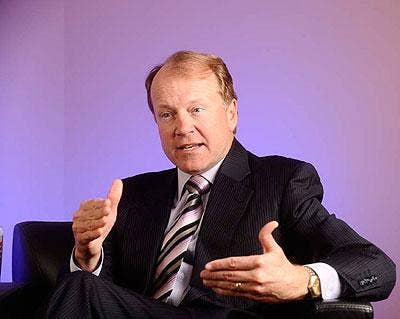
The softening in this economy, what impact is that having on the IT talent shortage?
Chambers: That's a very good question. I think we're still job-constrained in terms of IT talent, whether it's in this country or around the world. It's something I would like to see us be more aggressive on in terms of our immigration policy for people with college degrees, especially in high-tech that we expand the H-1B status capability, because each person that we bring to this country to put in engineering and high-tech generates two to three other jobs in my company, a good three to five jobs in the local economy ... Having said that, we're going to go wherever the talent is in the world, not as a labor arbitrage play but it is a focus on the war for talent and getting the best and the brightest around the world be a part of Cisco which we are clearly trying to do.
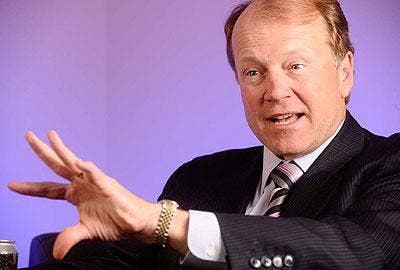
Can you talk a little bit about WebEx and what we'll see out of that this year?
Chambers: Yes, it's, fascinating ... While we've done over 130 acquisitions, WebEx has a very realistic possibility of being in the top five, maybe even in the top two in terms of the long-term contribution to Cisco. That's pretty unique company when you think of companies like Crescendo, our original acquisition, switching, which is now a $6 billion-plus marketplace for us or areas like Scientific-Atlanta which really enabled us to move into the service provider environment with more than just plumbing ... WebEx has the capabilities to expand well beyond just enabling collaboration, but providing many things as a service to the environment, embedding them deep into our products and a key differentiator for many of our customers and partners as well.

What about Linksys? It was about 2 years ago when you started talking about the future of that brand and what it might look like. Where is that going?
Chambers: I think you are going to see Linksys develop into a Cisco brand over time and it will evolve in logical steps -- Linksys, and then Linksys -- The Division of Cisco, then a Cisco-type brand. And part of the reason for that is it's no longer about a device in the home, it's about a home architecture. It's no longer about the home connected only within the home, it's about how does the home connect to us as we travel? It's how does the home connect to us in our business life? It's about literally a connected lifestyle regardless of where we are in the world, best set up for an architectural play.
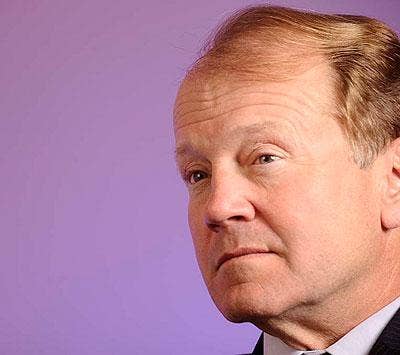
Your Chief Development Officer, Charles Giancarlo, recently left the company. He was widely seen as someone that was being groomed to be your successor. Is there someone now that you are grooming for that role?
Chambers: Well, we never comment upon most likely successors. I think it's very fair to say that we have always had three to five people in the succession line, and that we do not plan to make a change in that for at least three to five years ... But what Cisco has always been able to do is evolve its leadership team very successfully. Was Charlie in the final five and under consideration for those that might be the leaders in [the future]? Yes, he was. Which order we had him in is something that does not add value to the discussion. Am I very comfortable with our leadership evolution of our senior team? Oh yeah and we normally don't miss a beat. My job is to make sure when the eventual change comes as CEO, we don't miss a beat there either.